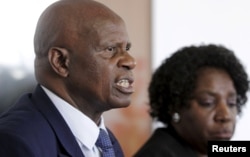A former senior U.S. diplomat says Washington must allow Zimbabwe to trade under the African Growth and Opportunity Act (AGOA). Witney Schneidman, who served as deputy assistant secretary of state for African affairs in President Bill Clinton's administration, says it would help Zimbabweans escape poverty and unemployment.
The call by Schneidman for the U.S. Congress to allow Zimbabwe to trade under AGOA takes place at a time when the country is trying to re-engage the West to assist in propping up the southern African country’s economy.
AGOA was enacted in 2000 to provide duty-free access to the U.S. market, and helps eligible sub-Saharan Africa nations grow. During a visit to Zimbabwe, Schneidman said he believes AGOA can be the starting point for Zimbabwe's struggling economy.
“Personally, I think Zimbabwe should be part of AGOA, but it is not," he said. "And when we deny the privileges, we have to make sure the people who make the products that qualify for AGOA aren’t hurt because of actions of people who have nothing to do with those products. I will go to Congress and urge them to look more carefully."
Under a White House executive order, there are travel and financial restrictions on a small number of people that undermined the democratic process, rule of law and respect for human rights. Since 2002, President Robert Mugabe and several members of his ZANU-PF party were sanctioned by most Western countries, including the U.S.
The list of those on sanctions has been shrinking as Zimbabwe’s human rights record is said to be improving.
A welcomed initiative
Schneidman is now a fellow at the Brookings Institution, a Washington research organization. Finance Minister Patrick Chinamasa says he welcomes Schneidman’s efforts to have Zimbabwe allowed to trade with the U.S. He says Washington's position is important when it comes to Zimbabwe negotiating lines of credit from international organizations such as the World Bank and the International Monetary Fund.
“These [Americans] are people who make things happen," he said. "They decide our fate, so to speak. They decide whether resources are to be channeled towards us or not and for what reasons; so it is important that we should be in good books with them.”
Chinamasa recently returned from Lima, the Peruvian capital, where the IMF and World Bank held its annual general meetings. He is optimistic that the two institutions are warming up to Harare, despite its $10 billion debt.
Many creditors have been snubbing Zimbabwe for about 15 years since Harare started defaulting. Chinamasa said creditors are convinced of Zimbabwe’s plan and commitment to retire its debts.














